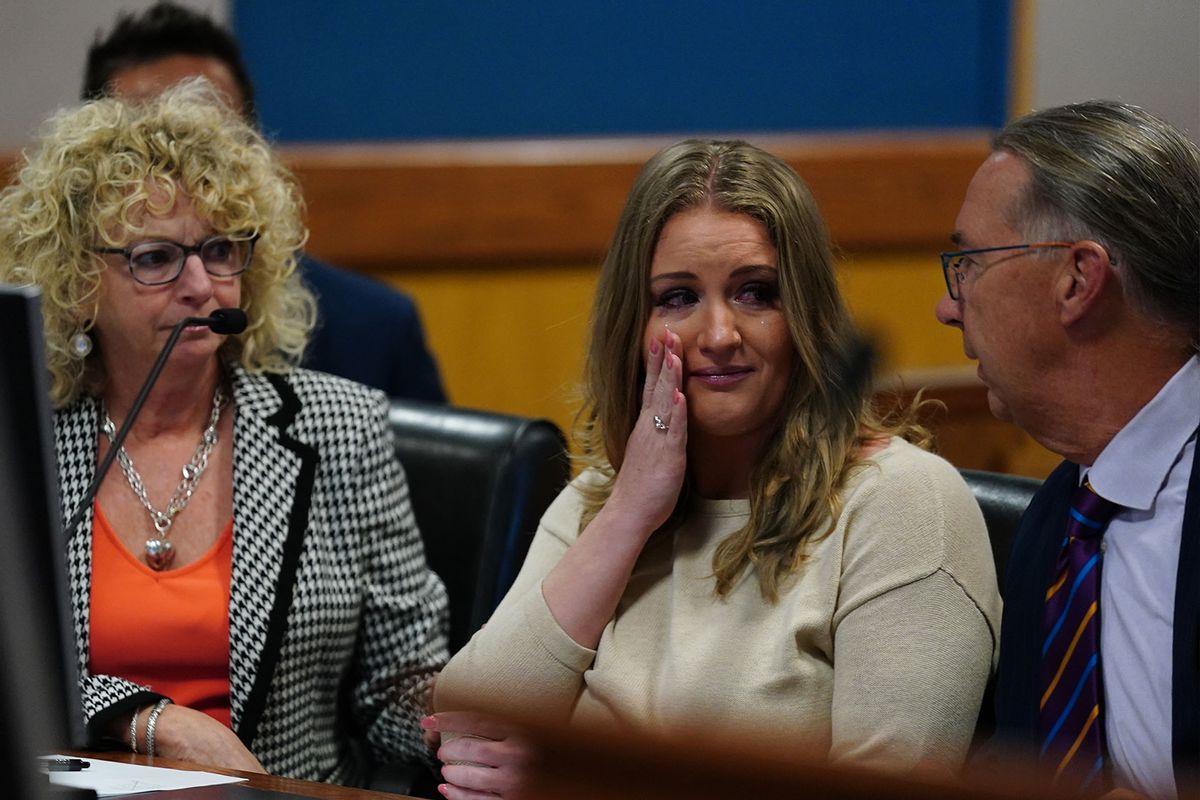One of Donald Trump's former attorneys has told prosecutors in Georgia that a top aide informed her that the former president was "not going to leave" the White House despite losing the 2020 election, according to video recordings obtained by The Washington Post and ABC News.
The disclosure emerged in a confidential interview with the attorney, Jenna Ellis, who spoke with Fulton County investigators. The onetime Trump lawyer pleaded guilty to one count of “aiding and abetting false statements and writings,” last month in exchange for her testimony.
She informed prosecutors that Dan Scavino, who served as Trump's deputy chief of staff at the time, remained undeterred by her assessment that the president was running out of options to contest Joe Biden's victory and told her "the boss" would refuse to leave the White House.
“And he said to me, you know, in a kind of excited tone, ‘Well, we don’t care, and we’re not going to leave,’” Ellis said in the video.
The newspaper also obtained portions of statements from lawyers Kenneth Chesebro and Sidney Powell, and Georgia bail bondsman Scott Hall. Their videos provided insight into previously undisclosed details about the attempts made by Trump and his allies to overturn his defeat.
Powell in her proffer detailed her plans regarding the nationwide seizure of voting machines and asserted that she was in frequent communication with Trump throughout her efforts to overturn the 2020 election—although both now assert that she was never his attorney.
As prosecutors pressed her on why Trump was looking to her for legal advice and ignoring the counsel of White House attorneys and others who told him that he had lost the election, Powell said “we were the only ones willing to support his effort to sustain the White House. I mean, everybody else was telling him to pack up and go,” The Post reported.
While Ellis’s statement could be used to “prove Trump’s intent” to overturn the election, Powell’s statement could be used to “show Trump’s knowledge of an illegal scheme,” former U.S. Attorney Barb McQuade, a University of Michigan law professor, told Salon.
“It is important to remember that these statements alone do not make up the prosecution’s case, and are only parts of the mosaic they must assemble to show a clear picture of criminal conduct,” McQuade said.
Trump and 18 co-defendants pleaded not guilty in August to all charges in a sweeping racketeering indictment brought by Fulton County District Attorney Fani Willis. The indictment alleges that Trump and his allies were involved in a "criminal enterprise" with the intention of maintaining his hold on power during the 2020 presidential election in the state of Georgia.
Four defendants including Chesebro, Ellis, Powell and Hall have since agreed to plead guilty to reduced charges and avoid jail time in exchange for their cooperation in the case.
Proffer sessions are typically conducted between the prosecution and the defense to determine whether a prosecutor will allow a defendant to plead guilty. A prosecutor will ask a defendant for a “proffer” of what the defendant knows about the case and what information the defendant is willing to reveal to the prosecution, and whether the defendant is willing to testify at a trial, Bennett Gershman, a former New York prosecutor and law professor at Pace University, told Salon.
We need your help to stay independent
“If the defendant’s information and cooperation satisfies the prosecutor, then the prosecutor will allow the defendant to take a favorable plea deal, often pleading guilty to a crime well below the maximum sentence that could be imposed if the defendant was convicted after a trial,” Gershman explained.
The statements made by defendants “clearly show” that Trump was deeply involved in the conspiracy to keep himself in office and prevent Biden from assuming the presidency, he added.
“Trump was the principal player in the conspiracy to delegitimize the election and remain in office regardless of the result,” Gershman said. “Indeed, Ellis was told by one of Trump’s key advisors – Dan Scavino – that Trump explicitly stated he would remain in office regardless of the result. He didn’t care what happened. He wouldn’t leave.”
Want a daily wrap-up of all the news and commentary Salon has to offer? Subscribe to our morning newsletter, Crash Course.
From Powell’s statements, it seems “absolutely clear” that the former president knew about the conduct of his fellow conspirators to disrupt the results of the election and specifically “intended to promote chaos,” thereby attempting to remain in office, Gershman continued.
The proffers are important since they “lock” the cooperating defendants into testimony that Trump refused to accept the results of the election, regardless of what his lawyers told him, Neama Rahmani, former federal prosecutor, told Salon.
“Powell’s video is also helpful because it shows her proximity to the former president, despite the defense’s argument that she was on the fringes and not part of his inner circle,” Rahmani said.
Trump, who is running for the GOP presidential nomination, is facing four criminal cases. In Georgia, the statements from witnesses could help prosecutors establish Trump's mindset during his challenge to Georgia's election results.
“Proving Trump’s knowledge and intent will be critical to the prosecutors convicting Trump of the criminal charges,” Gershman said.
Read more
about the Fulton County case
- "Potent weapon": Experts say ex-MAGA champion Jenna Ellis in "unique position" to doom Trump defense
- Trump blindsided by Powell guilty plea — and her “sweetheart deal” is ringing alarm bells: reports
- Legal experts: Trump's defense may be doomed as 5 more co-defendants seek Fulton plea deals
- Jenna Ellis' lawyer says she rushed to land plea deal — and warns Giuliani "should be" worried
- Legal expert: Jan. 6 architect's guilty plea turns the tables on Trump attempt to blame his lawyers



Shares